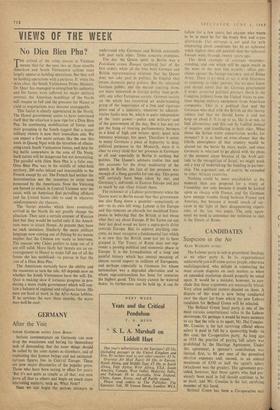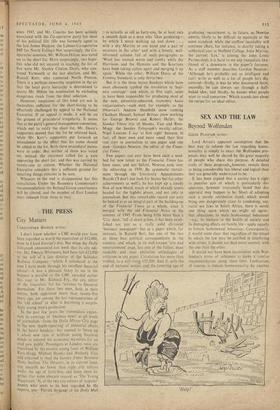ALAN WATKINS writes:
The Labour party is rich in procedural theology as no other party is. In its organisational underworld you will come across people,otherwisc undistinguished, who delight in conducting the most arcane disputes on such matters as when an amended resolution should properly be voted upon. It would be a mistake, however, to con- clude that these arguments are necessarily trivial. Very often political careers depend on them. A dispute of this kind is now being conducted over the short list from which the new Labour candidate for Bethnal Green will be selected.
The Bethnal Green local party is one of the most curious constitutional relics in the Labour movement. Or perhaps it would be more accurate to say that the relic is its agent, Mr. Dai Cousins. Mr. Cousins is the last surviving official whose salary is paid in full by a sponsoriEg body—in this case, the Co-operative party. As long ago as 1933 the practice of paying full salary was prohibited by the Hastings Agreement. Under this agreement, a sponsor's contribution wa, limited, first, to 80 per cent of the permitted election expenses and, second, to an annual maximum of £350 or half the agent's salars (whichever was the greater). The agreement pro vided, however, that those agents who had pre- viously been paid in full should continue to be so paid; and Mr. Cousins is the last surviving member of this band.
Bethnal Green has been a Co-operative scare
since 1945, and Mr. Cousins has been actively associated with the Co-operative party for most of his political life. (He was formerly agent to the late James Hudson, the Labour-Co-operative MP for. North Ealing.) Not surprisingly, the Co- Operative nominee, Mr. William Hilton, was voted on to the short list. More surprisingly, two hope- fuls who did not succeed in reaching the list of five were Mr. Stanley Clinton Davis, who con- tested Yarmouth at the last election, and Mr. Russell Kerr, who contested • North Preston. There is a perhaps unworthy suspicion in the air that the local party hierarchy is determined to secure Mr. Hilton the nomination by excluding dangerous rivals from the final selection.
However, suspicions of this kind are not in themselves sufficient for the short-listing to be effectively challenged by appeal to the National Executive. If an appeal is made, it will be on the ground of procedural irregularity. It seems that at the party's general management committee, which met to ratify the short list, Mr. Davis's supporters moved that the list be referred back, while Mr. Kerr's supporters put forward an amendment to the effect that his name should be added to the list. Both these procedural moves were in order. But neither of them was voted on; instead, the chairman called for a vote approving the short list; and this was carried by twenty-one to sixteen. Whether the National Executive considers this a sufficient ground for upsetting things jemains to be seen.
Whoever in the end is disappointed has this consolation. Under the Boundary Commission's recommendations the Bethnal Green constituency will be altered, and the number of East London seats reduced from three to two.



































 Previous page
Previous page